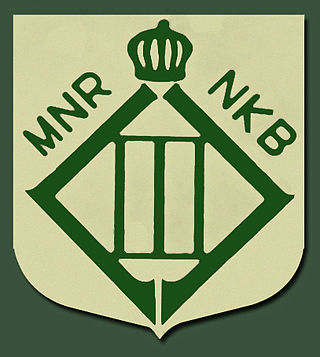Contents
| |||||
| Decades: | |||||
|---|---|---|---|---|---|
| See also: | Other events of 1944 List of years in Belgium | ||||
Events in the year 1944 in Belgium .
| |||||
| Decades: | |||||
|---|---|---|---|---|---|
| See also: | Other events of 1944 List of years in Belgium | ||||
Events in the year 1944 in Belgium .

Transport in Belgium is facilitated with well-developed road, air, rail and water networks. The rail network has 2,950 km (1,830 mi) of electrified tracks. There are 118,414 km (73,579 mi) of roads, among which there are 1,747 km (1,086 mi) of motorways, 13,892 km (8,632 mi) of main roads and 102,775 km (63,861 mi) of other paved roads. There is also a well-developed urban rail network in Brussels, Antwerp, Ghent and Charleroi. The ports of Antwerp and Bruges-Zeebrugge are two of the biggest seaports in Europe. Brussels Airport is Belgium's biggest airport.

Leopold III was King of the Belgians from 23 February 1934 until his abdication on 16 July 1951. At the outbreak of World War II, Leopold tried to maintain Belgian neutrality, but after the German invasion in May 1940, he surrendered his country, earning him much hostility, both at home and abroad.

The Battle of Rocoux took place on 11 October 1746 during the War of the Austrian Succession, at Rocourt, near Liège in the Prince-Bishopric of Liège, now modern Belgium. It was fought between a French army under Marshal Saxe and a combined British, Dutch, German and Austrian force led by Charles of Lorraine, John Ligonier and Prince Waldeck.

The Belgian Resistance collectively refers to the resistance movements opposed to the German occupation of Belgium during World War II. Within Belgium, resistance was fragmented between many separate organizations, divided by region and political stances. The resistance included both men and women from both Walloon and Flemish parts of the country. Aside from sabotage of military infrastructure in the country and assassinations of collaborators, these groups also published large numbers of underground newspapers, gathered intelligence and maintained various escape networks that helped Allied airmen trapped behind enemy lines escape from German-occupied Europe.

The royal question was a major political crisis in Belgium that lasted from 1945 to 1951, coming to a head between March and August 1950. The question at stake surrounded whether King Leopold III could return to the country and resume his constitutional role amid allegations that his actions during World War II had been contrary to the provisions of the Belgian Constitution. The crisis brought Belgium to the brink of a civil war. It was eventually resolved by the abdication of Leopold in favour of his son King Baudouin in 1951.

Despite being neutral at the start of World War II, Belgium and its colonial possessions found themselves at war after the country was invaded by German forces on 10 May 1940. After 18 days of fighting in which Belgian forces were pushed back into a small pocket in the north-west of the country, the Belgian military surrendered to the Germans, beginning an occupation that would endure until 1944. The surrender of 28 May was ordered by King Leopold III without the consultation of his government and sparked a political crisis after the war. Despite the capitulation, many Belgians managed to escape to the United Kingdom where they formed a government and army-in-exile on the Allied side.

The German invasion of Belgium was a military campaign which began on 4 August 1914. On 24 July, the Belgian government had announced that if war came it would uphold its neutrality. The Belgian government mobilised its armed forces on 31 July and a state of heightened alert was proclaimed in Germany. On 2 August, the German government sent an ultimatum to Belgium, demanding passage through the country and German forces invaded Luxembourg. Two days later, the Belgian government refused the German demands and the British government guaranteed military support to Belgium. The German government declared war on Belgium on 4 August; German troops crossed the border and began the Battle of Liège.

The Secret Army was an organisation within the Belgian Resistance, active during the German occupation of Belgium during World War II. With more than 54,000 members, it was by far the largest resistance group active in the country.

The National Royalist Movement was a group within the Belgian Resistance in German-occupied Belgium during World War II. It was active chiefly in Brussels and Flanders and was the most politically right-wing of the major Belgian resistance groups.

The Holocaust saw the systematic dispossession, deportation, and murder of Jews and Roma in German-occupied Belgium during World War II. Out of about 66,000 Jews in the country in May 1940, around 28,000 were murdered during the Holocaust.

The German occupation of Belgium during World War II began on 28 May 1940, when the Belgian army surrendered to German forces, and lasted until Belgium's liberation by the Western Allies between September 1944 and February 1945. It was the second time in less than thirty years that Germany had occupied Belgium.
Events from the year 1914 in Belgium.

Baron Augustin Édouard Michel du Faing d'Aigremont, born Augustin Édouard Michel was a Belgian army officer and general who served during World War I.
Events in the year 1945 in Belgium.
Events in the year 1869 in Belgium.
Events in the year 1867 in Belgium.
The following lists events that happened during 1905 in the Kingdom of Belgium.
Events in the year 1941 in Belgium
This is a page of the events in the year 1943 in Belgium.